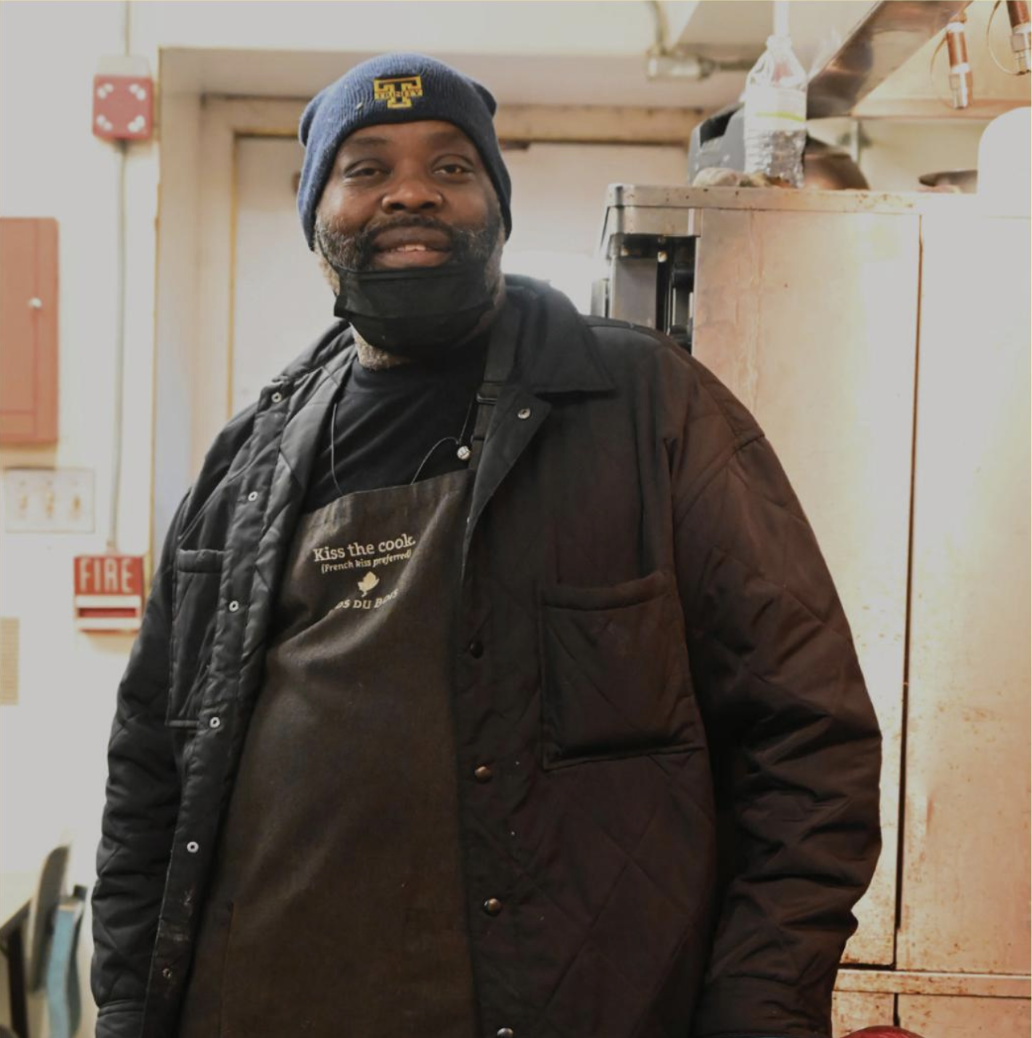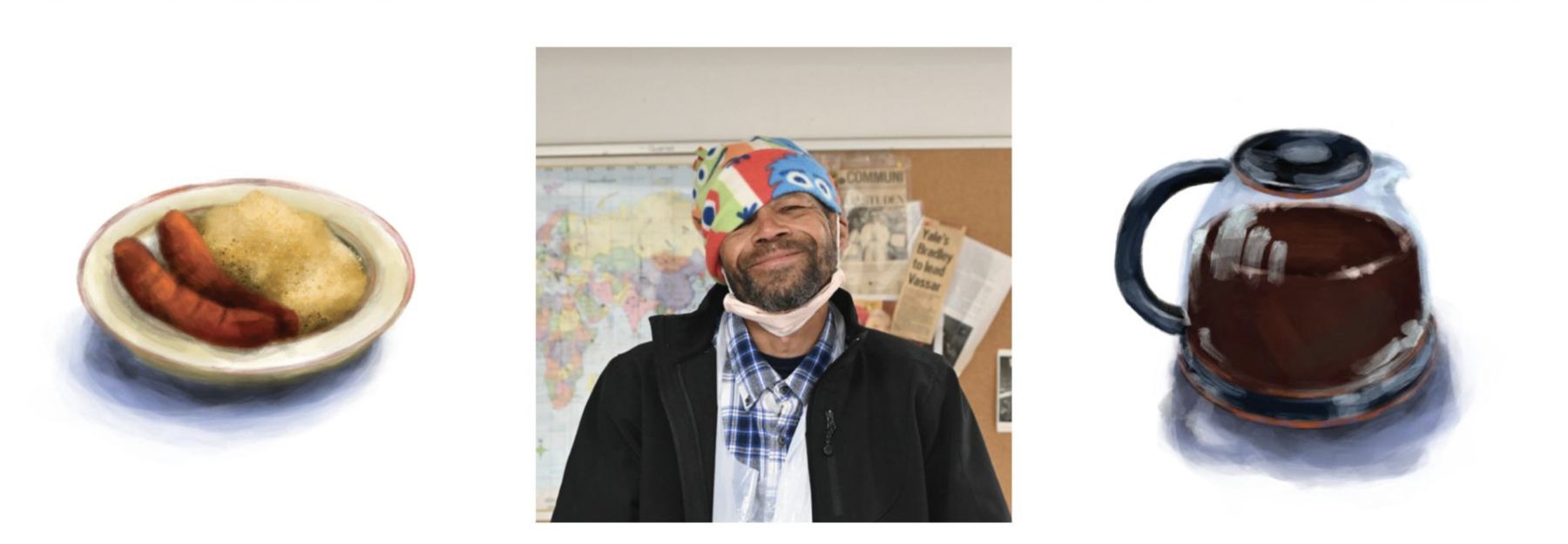Paul McDuffy has been feeding people since he was 12. “We were raised poor,” he tells me after his Friday shift at Sunrise Cafe. “And because of being poor, my mom taught us how to stretch $1 in the community.” McDuffy has lived in New Haven his entire life; he reminisces about the butcher at Ferraro’s Market who taught him to use his family’s food stamps to buy food in bulk, and the Westville neighborhood barbecues where his mom laid out burgers dripping in mayo and relish.

McDuffy—or Chef Duff, as he’s affectionately called by guests and coworkers at Sunrise Cafe—likes to use “we” interchangeably with “I” when he talks about food. Towering over staff in a threadbare apron and wrecked purple Jordans—a gift from his best friend and “corner brother”—Duff has a gentle gravity. He grew up in the nineteen-eighties, as New Haven faced economic collapse. The city was razing once-vibrant communities to construct the Oak Street Connector interstate, and the fiery factories that guarded the city’s harbor were transforming into vacant red-brick shells. From 1970 to 1980, the city went from being the thirty-eighth most impoverished in the nation to the seventh. By the time Duff was in ninth grade, a quarter of New Haven youth were living below the poverty line.
Duff’s classrooms were marked by conflict. His mom used to warn him: “Kids act out and bully other kids because they’re hungry.” She would pack an extra chicken sandwich in his bag each day to feed friends who didn’t have food at home. Watching them smile after a good meal invigorated pre-teen Duff: “We can show people love through food [so] I made a promise to feed as many people as possible.”
In 2015, Duff began working overnight shifts as a security guard. He recalls walking past a group of ten unhoused girls huddled against the morning chill on the New Haven Green, on his way to the Chapel Street bus stop. When one approached him, his immediate reflex was to hand her the contents of his wallet. “She politely said ‘No, sir, I really don’t want your money. I really am hungry.’” Instead of taking the bus home, Duff took the bus to Stop & Shop, bought $12 worth of canned bologna and Wonder Bread, and returned to the Green.
He kept coming back. Five days a week, Duff finished his guard shift and started cooking. His meals morphed from bologna sandwiches to boiling pots of meatball chili; he went from feeding ten people to hundreds. Friends and strangers alike helped him buy groceries and serve. “It was cool,” Duff says, “It was like the community was backing me.” In November 2020, word of Duff’s cooking and tenacity reached Sunrise Cafe’s doorstep. At the time, Sunrise was struggling with a dramatic drop in guests and fluctuations in kitchen staff.
Now it’s bustling. Open weekdays at 6:30 a.m., Sunrise serves free breakfast to some three hundred unhoused guests out of the basement of St. Paul and St. James’s church. Chef Duff uses donated ingredients to cook a perpetually rotating menu of fried fish tacos, sausage and grits, lasagna, French toast, and fried chicken. When I ask why lasagna for breakfast, Duff laughs. “I want to treat them. I want them to eat what they usually don’t get to eat.”

I first volunteered at Sunrise in late October. On the dark walk along Chapel Street, I anticipated a standard soup kitchen—bags of pre-packed food, limited seating, and a line of people twisting out onto the sidewalk. Instead, when I stepped through its glass doors, I was greeted with rows of white tablecloths stretched taut over wooden tables, slouching with fat vases of flowers and steaming cups of coffee. Guests sat and laughed, or danced to music spilling from a piano in the corner. A couple of volunteers ran from an industrial kitchen out into the dining room, balancing trays piled high with fish tacos, french toast, and orange juice.
Sunrise’s full menu and restaurant-style ordering system is the work of Ellen Gabrielle, who founded Sunrise in 2015. She envisioned a more humane soup kitchen—complete with a menu where guests can order and have food brought to them in a restaurant-style service model.
Sally, a retired nurse and social worker, has been volunteering for Sunrise since the beginning. She watched Ellen build the Cafe. “Yes, these places are very important for feeding… people. [But] the goal from the beginning was to make [Sunrise] a dignified place to eat.” Throughout our conversation, she keeps returning to the word “dignified.” If guests need an extra pair of gloves, clean socks, or someone to talk to, they ask for Sally. Wrapped in a mask, glasses, gloves, and a plastic apron, she slips between the kitchen, food pantry, and clothing closet with her keychain in hand.
Robert, most mornings, eats behind Sunrise’s piano. “I play it any chance I can. So I don’t forget,” he tells me with a smile, adjusting his black beanie as we talk. “Not having a place to be is a lot of pain to bear, so I use piano to get away from the suffering.” He pauses, placing his battered copy of R&B For Dummies on the music rack, and erupts: long fingers delicately pulling across the length of the glittering Yamaha, head swaying, eyes closed. Finding serendipitous joy like this is Robert’s driving conviction. “It’s good you can come to a place early in the morning to eat. And I get to play the piano here. That brings me happiness.”

Fostering a comforting space hasn’t always been easy. When Duff first arrived, “it was hard for us [to] even serve a meal without a fight breaking out.” He’s “quit in his head” a thousand times over. The weight of these challenges is built into the fabric of Sunrise: the heavily bolted pantry, plastic knives, and worn-through floors.
“Some days it’s intense. People have their moments,” says Casey, a mom of five who just moved to New Haven from Alaska. “Moments” are what Casey calls fights. Her oldest son, Eprum, a tall, curly-haired teen, sits next to me. “[Eprum] has moments all the time… because that’s what they are. They’re over soon.”
I sit down with Casey during a lull in my morning service. She’s soft-spoken, swathed in two jackets to keep warm from the January chill. As we talk, she turns away from me to lock eyes with Eprum, or leans over to brush the hair from her one-year-old’s forehead. Eprum is autistic, and Casey is solely responsible for his education. Between teaching and caring for her toddler, Casey hasn’t had time to find a job. The family is currently living in the Continuum Shelter on Foxon Boulevard. At the end of February, their ninety-day stay period will run out. “We don’t know what we’re going to do,” she says, her fingers wrapped tightly around Eprum’s hand. They’re hoping to receive a Section 8 voucher—a federally mandated program that subsidizes the cost of rent for low-income people—but, according to the Connecticut Department of Housing, it can take up to “a few months” for their application to be processed.
Robert is also trying to get Section 8 benefits. “To get a voucher you need papers. And it’s impossible to keep track of papers when you carry your life on your back. It’s not like you can lock your Social Security Card in a bush.” He laughs and fiddles with a few keys. “Right?”
The day we talk, Robert is leaving Sunrise early to attend a series of job interviews. He’s nervous about employment—he’s still reeling from a string of exploitative employers and worries the time spent on a job will be time taken away from finding housing. Earlier this year, he was hired to put up a wall for a church—a three-week stint of nailing, plastering, painting, and sweating in a church basement. “I went to the lady for my paycheck,” he says, “and she told me, ‘I’m not paying you.’ They know that if you don’t have a permit, a license, not insured, you don’t have a leg to stand on.”
Between fleeting conversations with guests and volunteers, I met a construction worker reeling from eviction, a musician from New Orleans who found a place to live, and a Yale Law School graduate grieving a brutal divorce. Despite varying tracks to homelessness, guests share parallel experiences in their fight to escape it. They describe their first nights without a home spent on friends’ couches and in cars; when their friends’ patience ran out, they turned to temporary shelters. These shelters house people anywhere from three to ninety days. But as homelessness rates continue to increase in Connecticut, shelter housing is stretched thin, leaving long waiting lists, and overcrowded accommodation. In hopes of a more reliable option, many apply for Section 8. But, as in Casey and Robert’s case, this process can take months. As shelter slips in and out of place, many end up on the streets. Most days, Robert walks until he finds somewhere safe enough to sleep. “There’s really no place where you can sit and be. You’re just wandering.”

In Sunrise’s cluttered kitchen, I meet Nelson, a dimpled, grinning 30-something who came to New Haven from Puerto Rico when he was 7. The move made him grow up fast; he supported himself and his sisters through high school before meeting his girlfriend of ten years. Nelson first became homeless after his girlfriend suffered a stroke, and he couldn’t spread his income thin enough to cover the costs of rent and healthcare. He thought he would never escape. “I used to sleep in hallways,” he tells me. “When I couldn’t find food, I just drank water.” For twelve years, he bounced between housing arrangements and living on the streets until landing in prison four years ago. He’s currently living in a halfway house while he works on getting his feet back under him. One of the ways he’s healing is by waking up at 5 a.m. every morning to volunteer at Sunrise. Nelson brims with enthusiasm, carrying trays of food three at a time, high-fiving and hugging me as we pass each other. “I wished someone would help me when I was starving on the streets. Now I can be that help for someone else.” For many of the volunteers, working at Sunrise is a way to reconcile their experiences with homelessness.
However, for many of the guests, eating at Sunrise can hold up a mirror to the battles they are facing. Robert stops me at the door. “I need you to know I don’t ever feel good having to come here another day.”
“You go in Sunrise and you look around and you see what you’re going through ten by ten by a hundred times.” Duff believes there can be power in that. “Get angry. We’re all in this fight together” he tells all of Sunrise’s guests. He wants them to walk through these doors and “leave better” —whether that be wiping down a tablecloth or going sober. Duff speaks a lot about the successes and failures he watches pass through Sunrise’s walls; “Everybody who [gets] a job comes to me and says ‘Chef, I have a job.’” They tell him if they found new housing, or bought their girlfriend a coat. They also tell him if they relapse, or get kicked out of a shelter.
Running to the back pantry to collect a bag of mango yogurt, stuffed unicorns, and applesauce, Duff triumphantly chants, “Baby’s here, baby’s here!” Arms laden with goodies—and a steaming stack of chocolate pancakes—he hugs Casey, Eprum, and Casey’s one-year-old. The chaos of Sunrise swells around them: piano filling the air, steam rising from cups of hot coffee, laughter booming from the kitchen. Casey left her support system when she left Alaska. “But Chef takes care of us,” she smiles.
“Evil works twenty-four hours a day. It never takes a break. It never rests. It never stops.” Duff’s voice cracks as he tells me this. You can feel this evil pressing in on all sides of Sunrise, a midnight swarm of evictions and addictions, of bad employers and bottomless legal battles. “I gotta go ahead and make sure we love each other.”
— Sophie Lamb is a first-year in Jonathan Edwards College.
Photography by Nithya Guthikonda & Illustrations by Cate Roser.


